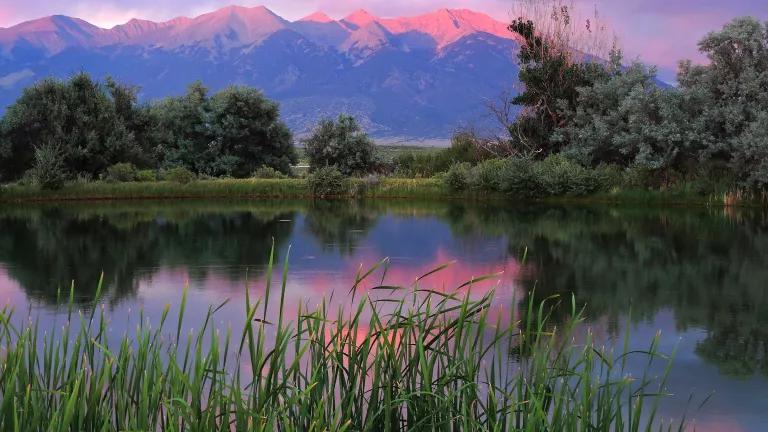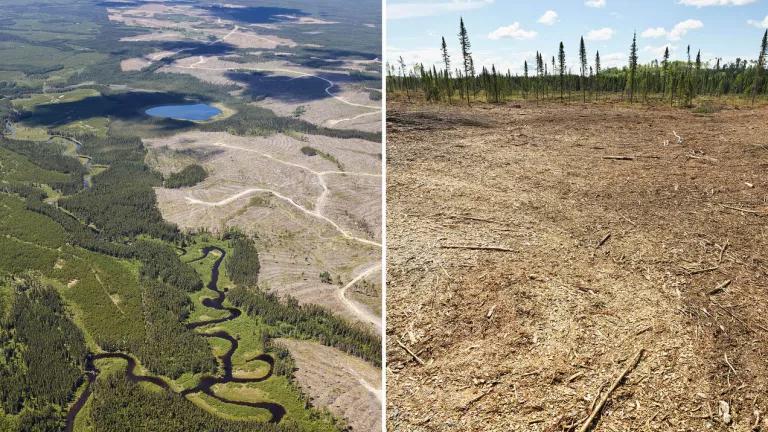Of Colorado's Wetlands Protection Bills, Only HB 1379 Gets the Job Done
Colorado urgently needs to step up to safeguard our wetlands and streams left vulnerable by the Sackett decision.

Sunset over Blanca Wetlands in Great Sand Dunes National Park
Patrick Myers/NPS
This blog is coauthored with Hattie Johnson, Southern Rockies Restoration Director, American Whitewater
Now is the critical time to step up and strengthen protections for Colorado’s and our nation’s invaluable water resources, chief among them the tens of millions of acres of wetlands and millions of miles of streams that are now at risk of unregulated pollution and destruction. Without correct intervention, it seems almost certain that Colorado is experiencing peak clean water and will begin to see its waterways degrade—and disappear—in the years to come.
A new blockbuster report from the U.S. Fish & Wildlife Service reveals that, between 2009–2019, the country experienced a serious decline in the amount of wetlands we have. Frighteningly, the nation lost about 670,000 acres (an area larger than Rhode Island) of vegetated wetlands, which perform more ecosystem services than the ponds that often replace them. This news comes 11 months after the Supreme Court’s decision on Sackett v. U.S. Environmental Protection Agency (EPA) dramatically weakened the federal Clean Water Act’s protections for wetlands and streams.
Wetlands provide multiple services to our society and safeguard the health of our families and communities by sustaining wildlife and its habitat, filtering pollution, contributing to drinking water supplies, building resistance to climate change, and helping to prevent erosion, flooding, drought, and fire. Their economic value is astonishing, with wetlands' estimated ecosystem services globally valued annually at more than $47 trillion. For comparison, the U.S. budget in 2023 was $6.2 trillion.
Hope is emerging in a few states, including Colorado. With federal safeguards eliminated by the Supreme Court’s disastrous decision, Colorado is one of the states where there is no program to regulate filling wetland areas and require industrial dischargers to avoid, minimize, and offset the harm of their projects.
As a state that prides itself on the outdoor recreation opportunities our incredible lands and waterways provide, it is critical that Colorado take steps to ensure that all Coloradans and visitors can paddle, fish, swim, and splash without fear of getting sick. Anglers and whitewater paddlers understand the importance of clean and healthy rivers in preserving human health and providing communities with opportunities for outdoor recreation.
Fortunately, a bill led by House Speaker Julie McCluskie, Representative Karen McCormick, and Senator Dylan Roberts is moving forward in the General Assembly that would mostly restore the fundamental protections lost under the Sackett decision.
House Bill 24-1379 establishes a permitting program under the Colorado Department of Public Health and Environment for dredge and fill activities that impact state waters. It would protect wetlands and seasonal streams and hold industry accountable for its actions.
An alternative bill, Senate Bill 24-127, introduced by Senator Barbara Kirkmeyer and Representative Shannon Bird of Westminster, falls far short of restoring the level of protections that Colorado waters had before the Sackett decision.
Only one bill will get the job done: Speaker McCluskie’s. Let’s dive into each of them a bit more to show why.
The speaker’s bill, HB 1379, provides a solution that sufficiently addresses the gap of protections created by the Sackett decision and is consistent with the very intent of the Clean Water Act to set a floor for state regulation, not a ceiling. In contrast, SB 127 puts federal law as the ceiling—setting us up for a continual erosion of our clean water protections in the state. Colorado has lost 50 percent of its wetlands since the late 1800s and is in the midst of the worst drought in 1,200 years. Given the severity of this situation, now is not a time for decision makers to fall short in restoring protections.
HB 1379 best aligns with the federal Clean Water Act’s dredge and fill policies by ensuring that the permitting program must be at least as protective as the federal guidelines already developed by the EPA and U.S. Army Corps of Engineers. Those guidelines focus on avoiding damage first, then minimization, and then compensatory mitigation of unavoidable adverse impacts, including “temporary” harms.
The bill, importantly, requires the implementation of actions that have the least adverse impacts. SB 127 does not—it lacks a consistent requirement to avoid, minimize, and then mitigate impacts to wetlands and streams from dredge and fill activities. And it ignores temporary impacts, though harm from such activities can last for years, if not decades. In fact, SB 127 has virtually no standards for what must be considered during individual permit review; its only direction to a newly formed commission is that the rules cannot be stricter than the federal guidelines.
HB 1379 uses the well-established definition of state waters to protect the types of waterbodies covered pre-Sackett, including all kinds of wetlands and rain-dependent streams, while maintaining permitting exemptions and exclusions for various types of waters included in the Clean Water Act and federal regulations. SB 127 would exclude a broader set of waters from the program and exempt more activities than the federal rules. SB127 would also allow destructive filling of wetlands farther than 1,500 feet from other waters and outside such waters’ floodplains without any environmental review. Advocates for SB 127 say the bill at least requires review before a project can occur in a fen, which can take thousands of years to form, but this provision does not make up for the greater loss of clean water protections that this inadequate bill would bring.
It is also notable that Colorado, along with American Whitewater and NRDC, is one of the initial signatories to the America the Beautiful Freshwater Challenge, which establishes strong new national goals for restoring and protecting wetlands and streams. HB 1379 is much more in line with that commitment than the alternative bill.
As noted, SB 127 falls short of protecting waters left vulnerable by the Sackett decision. The bill would create a vague new “cost-benefit” approach for permitting and overall program management that was never required at the national level. Such a process is confusing, costly, and time-consuming; it will only complicate the permitting process. SB 127 would also be more costly for taxpayers because it would create a new division and commission that duplicates the state’s existing Water Quality Control Division and Commission.
Now is not the time to put the state’s remaining vital wetlands and seasonal streams, which help supply drinking water and critical wildlife habitat, at further risk. Doing so would be less protective of public health, biodiversity, and the state’s economy.
Instead, we should open the floodgates of support for HB 1379 and press for its adoption before the General Assembly wraps up its 2024 session on May 8.
Colorado urgently needs to step up to safeguard our wetlands and streams that were left vulnerable by the Sackett decision—waters that must be protected for Coloradans today and for those who will live and thrive in our state tomorrow.



